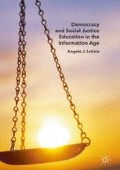Abstract
This chapter casts academic writing performed in classrooms as a democratic activity. Specifically, this chapter draws on the notions of self-authorship and provides a template for teachers and students to use to guide their writing through different levels of cognitive development, from summary, to evaluation to creation. This process is linked to citizenship because summary, evaluation and creation are cast as necessary to grapple with the ever-increasing amounts of information. This chapter also promotes the idea that students should use their writing to create insights for democracy, which later generations can make meaning from. The chapter concludes by linking the ideas of writing for democracy with relevant skills, dispositions and school climate attributes.
Access this chapter
Tax calculation will be finalised at checkout
Purchases are for personal use only
References
Barber, J. (2012). Integration of learning: A grounded theory analysis of college students learning. American Educational Research Journal, 49, 590–617. doi: 10.3102/0002831212437854
Baxter Magolda, M. (2004). Self-authorship as the common goal of 21st century education. In M. B. Baxter Magolda & P. M. King (Eds.), Learning partnerships: Theory and models of practice to educate for self-authorship (pp. 1–36). Sterling, VA: Stylus.
Baxter Magolda, M. (2009). Authoring your life: Developing an internal voice to navigate life’s challenges. Sterling, VA: Stylus.
Bloom, B. (1956). Taxonomy of educational objectives: The classification of educational goals. Handbook I: Cognitive domain. New York, NY: David McKay.
Boix-Mansilla, V., Dawes Duraisingh, L., Wolfe, C. R., & Haynes, C. A. (2009). Targeted assessment rubric: An empirically grounded rubric for interdisciplinary writing. The Journal of Higher Education, 80, 334–353. doi: 10.1353/jhe.0.0044
Booth, W., Colomb, G., & Williams, T. (2008). The craft of research (3rd ed.). Chicago, IL: The University of Chicago Press.
Brookhart, S. (2008). How to give effective feedback to your students. Alexandria, VA: ASCD.
Cohen, J. (2006). Social, emotional, ethical, and academic education: Creating a climate for learning, participation in democracy, and well-being. Harvard Education Review, 76(2), 201–238. doi: 10.17763/haer.76.2.j44854x1524644vn
Cohen, J., McCabe, L., Michelli, N., & Pickeral, T. (2009). School climate: Research, policy, practice, and teacher education. Teachers College Record, 111(1), 180–213.
Cohen, J., Pickeral, T., & Levine, P. (2010). The foundation for democracy: Promoting social, emotional, ethical, cognitive skills and dispositions in K-12 schools. Interamerican Journal of Education for Democracy, 3(1), 74–94.
Dewey, J. (1988). John Dewey: The later works, 1925–1953. Volume 14 (Eds. Boydston, J.A. & Sharpe, A.). Carbondale: Southern Ilinois Press.
Erikson, E. (1985). Childhood and society. New York, NY: W.W. Norton & Company.
Evans, N., Forney, D., Guido, F., Patton, L., & Renn, K. (2010). Student development in college: Theory, research and practice (2nd ed.). San Francisco: Jossey-Bass.
Fullan, M. (2001). Leading in a culture of change. San Francisco, CA: Jossey-Bass.
Giroux, H. (1988). Teachers as intellectuals: Toward a critical pedagogy of learning. Granby, MA: Bergin & Garvey.
Hattie, J. (2009). Visible learning: A synthesis of over 800 meta-analyses relating to achievement. New York, NY: Routledge.
Haynes, C. (2004). Promoting self-authorship through an interdisciplinary writing curriculum. In M. B. Baxter Magolda & P. M. King (Eds.), Learning partnerships: Theory and models of practice to educate for self-authorship (pp. 63–90). Sterling, VA: Stylus.
Kegan, R. (1994). In over our heads: The mental demands of modern life. Cambridge, MA: Harvard University Press.
Letizia, A. (2016b). Student writing for self-authorship and democracy. Journal of College Student Development, 57(2), 219–223. doi: 10.1353/csd.2016.0017
Letizia, A. (2016d). Writing about the past is essential for the future: Fostering student writing for citizenship in K-12 and community college classrooms. The History Teacher, 49(2), 1–22.
Lickona, T., & Davidson, M. (2005). Smart and good schools: Integrating excellence and ethics for success in school, work and beyond. Center for the 4th and 5th Rs (Respect and Responsibility) State University of New York College at Cortland.
Marginson, S. (2010). Introduction: The protean and the global. In S. Marginson, P. Murphy, & M. Peters (Eds.), Global creation: Space, mobility and synchrony in the age of the knowledge economy (pp. 1–17). New York: Peter Lang.
Nash, R. (2009). Crossover pedagogy: The collaborative search for meaning. About Campus, March–April, 2–9. doi: 10.1002/abc.277
Nash, R., & Murray, M. (2010). Helping college students find purpose: The campus guide to meaning making. San Francisco, CA: Jossey-Bass.
Nash, R., & Jang, J. (2015). Preparing students for life beyond college: A meaning centered vision for holistic teaching and learning. New York, NY: Routledge.
National Writers Project: 2011–2012 Report. The University of California.Retrieved from: http://www.nwp.org/
Perry, W. (1968). Forms of intellectual and ethical development in the college years: A scheme. New York, NY: Holt, Rinehart & Winston.
Pink, D. (2005). A whole new mind: Why right-brainers will rule the future. New York, NY: Riverhead Books.
Shafer, G. (2013). Higher level thinking, writing, and democracy among community college students. Community College Journal of Research and Practice, 37(5), 382–387. doi: org/10.1080/10668921003609244
Tarcov, N. (1996). Democracy, nurturance, and community. In R. Soder (Ed.), Democracy, education and the schools (pp. 1–35). San Francisco: Jossey Bass.
Weerts, D., Rasmussen, C., & Singh, V. (2015). Using design thinking to drive collective impact in higher education. In J. Lane (Ed.), Higher education reconsidered: Executing change to drive collective impact. Albany, NY: SUNY Press.
Weerts, D., Singh, V., Horn, A., & Taylor, L. (2015). Design thinking for higher education policy innovation. Paper presented for the 41st Annual Conference of Association for the Study of Higher Education, Denver, Colorado.
Westheimer, J., & Kahne, J. (2004). What kind of citizen? The politics of educating for democracy. American Educational Research Journal, 41(2), 1–30.doi: 10.3102/00028312041002237
Wheeler, D. (2012). Servant leadership for higher education: Principles and practice. San Francisco, CA: Jossey-Bass.
Author information
Authors and Affiliations
Rights and permissions
Copyright information
© 2017 The Author(s)
About this chapter
Cite this chapter
Letizia, A.J. (2017). Writing for Democracy. In: Democracy and Social Justice Education in the Information Age. Palgrave Macmillan, Cham. https://doi.org/10.1007/978-3-319-40769-2_9
Download citation
DOI: https://doi.org/10.1007/978-3-319-40769-2_9
Published:
Publisher Name: Palgrave Macmillan, Cham
Print ISBN: 978-3-319-40768-5
Online ISBN: 978-3-319-40769-2
eBook Packages: EducationEducation (R0)

